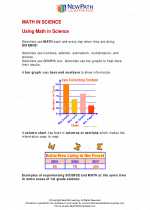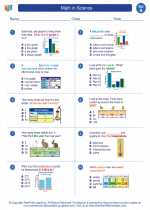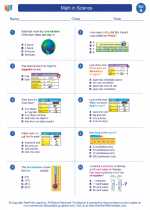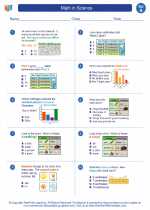Systems in Science
In science, a system is a group of interacting, interrelated, or interdependent components that form a complex and unified whole. Systems can be found in all areas of science, from the human body to the solar system.
Types of Systems
There are two main types of systems:
- Open Systems: These are systems that can exchange both matter and energy with their surroundings. Examples include a boiling pot of water or a living organism.
- Closed Systems: These are systems that can exchange energy but not matter with their surroundings. An example is a sealed terrarium.
Components of a System
A system is made up of various components that work together to achieve a specific function or goal. These components can include:
- Inputs: These are the resources or materials that enter the system.
- Processes: These are the interactions and transformations that occur within the system.
- Outputs: These are the results or products that are produced by the system.
- Feedback: This is the information that is returned to the system, which can influence future behavior.
Examples of Systems
Here are some examples of systems in different scientific contexts:
- Ecological System: A forest ecosystem consisting of trees, plants, animals, and microorganisms interacting with each other and their environment.
- Respiratory System: The human respiratory system, which includes the lungs, diaphragm, and airways working together to exchange oxygen and carbon dioxide.
- Solar System: The sun, planets, moons, and other celestial bodies that are bound together by gravity in the vast expanse of space.
Study Guide
When studying systems in science, it's important to understand the following key concepts:
- The difference between open and closed systems.
- The components of a system, including inputs, processes, outputs, and feedback.
- Real-world examples of systems in different scientific disciplines.
- How systems can be analyzed and modeled to understand their behavior and interactions.
By mastering these concepts, you will develop a deeper understanding of how systems function and their significance in the natural world.
[Systems] Related Worksheets and Study Guides:
.◂Science Worksheets and Study Guides First Grade. Math in Science
Study Guide Math in Science - 1st grade level
Math in Science - 1st grade level  Worksheet/Answer key
Worksheet/Answer key Math in Science - 1st grade level
Math in Science - 1st grade level  Worksheet/Answer key
Worksheet/Answer key Math in Science - 1st grade level
Math in Science - 1st grade level  Worksheet/Answer key
Worksheet/Answer key Math in Science - 1st grade level
Math in Science - 1st grade level 

 Worksheet/Answer key
Worksheet/Answer key
 Worksheet/Answer key
Worksheet/Answer key
 Worksheet/Answer key
Worksheet/Answer key

The resources above cover the following skills:
EARTH AND SPACE SCIENCE
Earth’s Place in the Universe
Observe seasonal patterns of sunrise and sunset to describe the relationship between the number of hours of daylight and the time of year (e.g., more hours of daylight during summer as compared to winter).